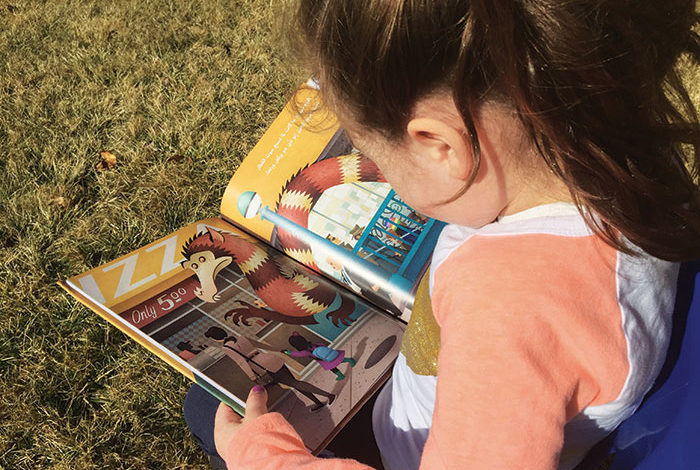 |
| Makhoul’s daughter reading “The Girl Who Lost Her Imagination” |
NEW YORK — Wars and violence in the Middle East have caused the birth of numerous babies in the diaspora, which, in turn, drastically decreases the number of Arabic-speaking children.
Many Arab parents in America have a hard time teaching their children how to speak the Arabic language. Even when taught at a special Arabic school, children learn fusha (classical Arabic), so they do not learn how to communicate colloquially.
Reem Makhoul, a mother of two, decided to change that by writing storybooks in colloquial Arabic.
The 36-year-old Palestinian journalist, who used to work for both The New York Times and The Wall Street Journal, took some time off to raise her baby daughter and work more on her project with her husband.
Makhoul was born in Galilee, Palestine in 1980 and moved to Jerusalem to study at a university and work. While covering the 2006 Israel war on Lebanon, she met her husband, New York Times journalist Stephen Farrell, who was also covering the war.
They are now parents to two daughters, 5-year-old Sheherazade and 1-year-old Nairouz.
Makhoul said she’d always felt that children’s books written in classical Arabic made characters sound like adults.
“When I was growing up in Galilee and reading children’s books, all of which were written in fusha, it was always in the back of my mind that there was something stilted about them,” she said. “Children and animals talking like lawyers. But it became more of a real, live issue for me when my first daughter, Sheherazade, was born and I started reading to her.”
Makhoul disliked the fact that she had to translate the fusha so that her daughter could understand.
“The story lost its flow,” she said. “I got tired very quickly and she wasn’t enjoying it. I looked for books in amiyyeh (colloquial Arabic) and couldn’t find any; so I decided to write them myself.”
Makhoul and Farrell decided to start their own New York-based publishing company, “Ossass Stories”, and use a printing company in New Jersey.
“We write the books together and they are illustrated by a wonderful artist named Fouad Mezher in Beirut, who we have never actually met,” Makhoul said. “It’s the age of digital communications, so we are able to have all our discussions online and send drafts to each other by email.”
Their first book, “The Girl Who Lost Her Imagination”, came out last year and is published in the Shami dialect, which is spoken in Palestine, Lebanon, Syria and Jordan. They also plan on publishing an edition in the Egyptian dialect, and possibly more, later on.
“We’re now working on our second book, ‘Where Shall I Hide?’, which will be published before the end of the year, also in Shami,” Makhoul said. “The plan is then to bring out an Egyptian edition of both books, with the help of friends and colleagues who have advised us on dialect words and phrases. We’ve been getting very enthusiastic feedback from Arabs all around the world, who speak different dialects, asking us to publish it in Moroccan, Tunisian, Iraqi and Gulf Arabic. This is our dream and what we are working toward.”
Makhoul described “The Girl Who Lost Her Imagination” as an illustrated children’s book about a little Arab girl with a vivid khayaal (imagination) who resides in New York City.
She said they brought “Khayaal” to life as a character in the book whom Sheherazade, the little girl, loses.
“The story is about how she and her imagination find each other again,” she said. “The story makes very heavy use of colors, especially rainbows, to introduce children and students to words that will be useful to them. The next book will be about shapes, the one after that about animals and so forth.”
She added that her daughter Sheherazade inspired the name of the heroine in the book.
Makhoul said she understands the frustration parents feel when they find their children communicating in English easily, but not in Arabic. She advised them not to give up.
“It’s very hard and frustrating at times to have your children communicate more fluently in English or other languages,” she said. “I go through the exact same thing. That’s why we started this project in the first place. When my daughter was born, I decided to speak with her in Arabic.”
She added that the diaspora has shown a lot of interest in their book because many parents want their kids to speak the Arabic language.
“We have had almost no negative reactions at all,” she said. “I think most people understand that we are not trying to undermine formal Arabic; we are trying to introduce children to a love of the Arabic language so that they can appreciate it in all its forms.”
Their first book is available at www.ossass-stories.com, for worldwide shipping. The New York and Brooklyn Public Library branches in areas with a high concentration of Arabs also stock it.
It’s available at the Arab American National Museum in Dearborn and at the Middle East and More bookshop in Washington D.C. It’s also in bookshops in London, Oslo, Paris, Jerusalem and Byblos, Lebanon.






Leave a Reply